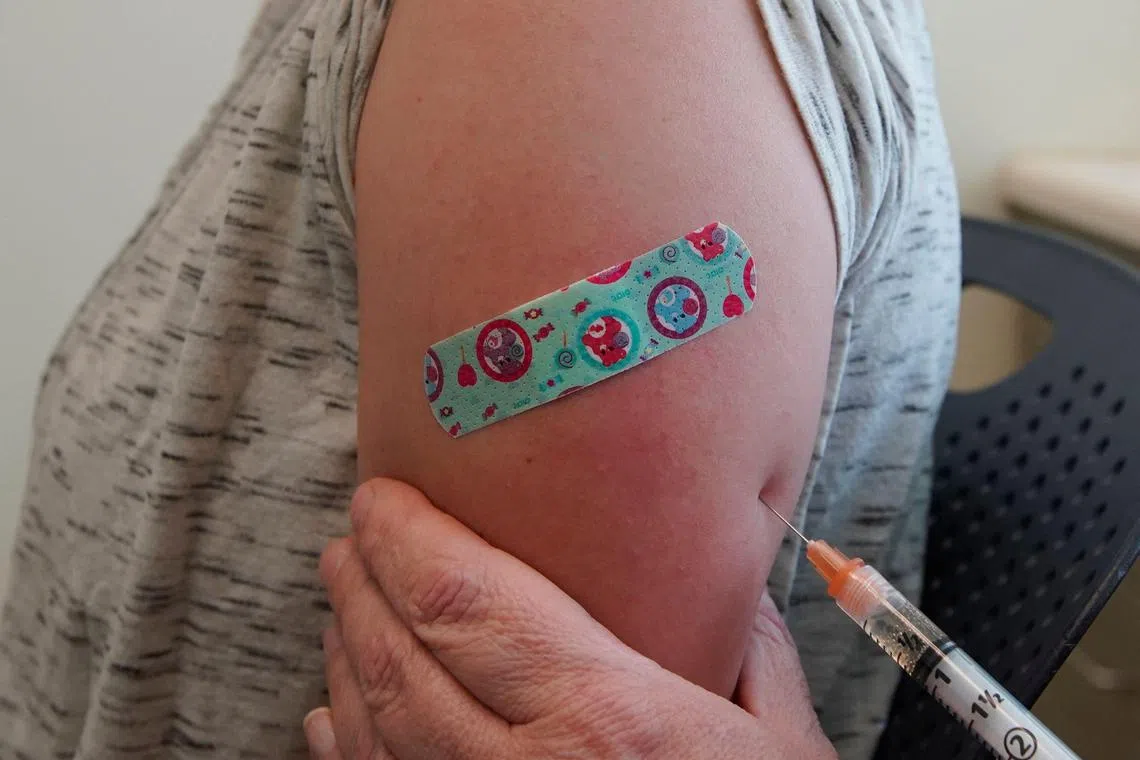US health chief Kennedy clashes with lawmakers over vaccine comments
Sign up now: Get ST's newsletters delivered to your inbox

Some of the most heated exchanges centred on Mr Robert F. Kennedy Jr remarks on vaccines.
PHOTO: AFP
WASHINGTON – Mr Robert F. Kennedy Jr came under fire on May 14 from lawmakers who said he has made false statements over vaccine testing and safety since taking the nation’s top health job.
Mr Kennedy made his first appearance in Congress since his confirmation as health and human services secretary in February, facing questions over everything from his mass layoffs at federal health agencies to his handling of a worsening US measles outbreak.
Some of the most heated exchanges centred on his remarks on vaccines. Mr Kennedy has for years sown doubt about the safety and efficacy of vaccines, but pledged to maintain the country’s existing vaccine standards to secure his appointment in the Trump administration.
Republican US Senator Bill Cassidy, a physician from Louisiana who helped pave the way for Mr Kennedy’s confirmation, corrected the secretary’s assertion that the Covid-19 vaccine is the only shot tested against a placebo in clinical trials.
“The secretary said no vaccines, except for Covid-19, have been evaluated against placebo. For the record, that’s not true,” said Dr Cassidy, who chairs the Senate Committee on Health, Education, Labour, and Pensions (Help).
“Coronavirus, measles, and HPV vaccines have been, and some vaccines are tested against previous versions, just for the record,” said Dr Cassidy, who chairs the Senate Help Committee.
Democratic Senator Christopher Murphy of Connecticut said Mr Kennedy had not lived up to his commitment to Dr Cassidy and the committee during his confirmation hearing.
“As soon as you were sworn in, you announced new standards for vaccine approvals that you proudly referred to in your own press release as a radical departure from current practice, and experts say that departure will delay approvals,” said Mr Murphy.
“You also said, specific to the measles vaccine, that you support the measles vaccine, but you have consistently been undermining the measles vaccine,” Mr Murphy said.
“You told the public that the vaccine wanes very quickly... and said that the measles vaccine was never properly tested for safety. You said there’s foetal debris in the measles vaccine.”
“All true,” Mr Kennedy shouted back as Mr Murphy listed his comments.
“I’m not going to just tell people everything is safe and effective if I know that there’s issues,” he said.
The measles vaccine has been shown to be safe and highly effective at preventing infection and does not contain foetal debris.
Mr Kennedy has drawn condemnation from health officials for what they say is a weak endorsement of measles shots during an outbreak that has infected more than 1,000, mostly unvaccinated people and killed three.
Audience members at the Help hearing wore stickers saying “When Bobby lies, children die” and “anti-vax, anti-science, anti-America” in reference to Mr Kennedy’s vaccine views.
Some protesters shouting opposition to Mr Kennedy’s positions, were dragged out by the capitol police, including Mr Ben Cohen, co-founder of Ben and Jerry’s ice cream.
“You’re killing poor kids in Gaza and paying for it by cutting Medicaid for kids here,” shouted Mr Cohen, who had attended a pro-Palestine event with Democratic Representative Rashida Tlaib earlier on May 14 referring to Medicaid cuts proposed in the Republican spending bill and US support for Israel’s war in Gaza.
Up to me
Mr Kennedy has said his top priorities as health secretary include identifying the environmental contributors to autism and tackling rising rates of chronic disease.
He has vowed to remake the nation’s health agencies, including cutting 10,000 jobs at the Food and Drug Administration, Centres for Disease Control and Prevention (CDC) and the National Institutes of Health (NIH).
The Senate hearing on May 14 and one before a House Appropriations sub-committee earlier in the day were meant to review Mr Kennedy’s health-related spending plans under President Donald Trump’s budget proposal, including an US$18 billion (S$23.38 billion) cut to NIH funding and US$3.6 billion from the CDC.
Democrats and other critics have portrayed the cuts as a gutting of the country’s public health infrastructure.
Mr Kennedy told the Appropriations Committee they would save taxpayers US$1.8 billion per year and make the department more efficient.
“Our reductions have focused on aligning Department of Health and Human Services’ (HHS) staffing levels to reflect the size of HHS prior to the Covid-19 pandemic, which saw around a 15 per cent increase in the number of employees,” Mr Kennedy said in his opening statement to the House subcommittee.
The cuts and firings were his decision, not edicts from Mr Elon Musk, Mr Kennedy said when asked about the billionaire Trump ally’s involvement. Mr Musk is leading the Doge initiative to cut government funding and reshape the federal bureaucracy.
“Elon Musk gave us help in trying and figuring out where there was fraud and abuse in the department,” Mr Kennedy testified. “But it was up to me to make the decision, and there are many instances where I pushed back.”
Mr Kennedy said he was willing to work with Democrats on lowering prescription drug prices in response to a question from Senator Bernie Sanders, a Vermont independent who votes with Democrats.
Mr Trump signed an executive order on May 12 directing drugmakers to lower their prices to align with what other countries pay that analysts and legal experts said would be difficult to implement. REUTERS


